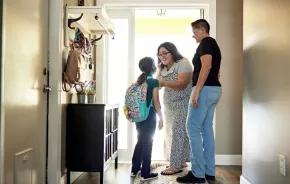You’ve always been savvy enough to dodge conversational hot topics like politics and religion. Bet you never thought you’d be sidestepping one more contentious issue in the school parking lot: homework.
 Like so many things in life, views on homework are incredibly subjective. For some families, there’s way too much; others wish their kids were getting more. The only thing most will agree on? It’s never, ever just right.
Like so many things in life, views on homework are incredibly subjective. For some families, there’s way too much; others wish their kids were getting more. The only thing most will agree on? It’s never, ever just right.
Add to that a growing group of educators and experts who say that homework, for the most part, is basically useless.
“Amazingly, no research has ever shown that homework — that is, making kids work a second shift after having spent all day in school — provides any benefits, academic or otherwise, at least before the age of 15 or so, and possibly not even then,” says Alfie Kohn, author of The Homework Myth: Why Our Kids Get Too Much of a Bad Thing. “Given the clear disadvantages — frustration, exhaustion, family conflict, loss of time, and possible diminution of interest in learning — it really does appear that homework is all pain and no gain.”
Nancy Kalish, author of The Case Against Homework, says current practices in homework are just not working — and parents are often part of the problem. “They want schools to be more rigorous, and the only part of school they see is homework.” She knows first- and second-graders who do an hour or two of homework every night. “What about story time, bath time and dinner time?
“There’s a point where homework goes over the edge and out of balance,” Kalish says. “It’s taking the place of other things that are very important for the proper development of children.”
Briana Bennitt, executive director of Three Cedars Waldorf School in Bellevue, says it’s not unusual to hear parents bragging — as if they’re proud — about how their 12-year-old was up all night typing a paper, or how their 8-year-old worked on “skill and drill” for hours after school. “It seems like a high school or university level of study is thought to be best introduced earlier and earlier with each passing decade,” she says.
Waldorf educators stress the importance of family time, rest and after-school recreation, says Bennitt. “I wish parents would recognize that their children are tired, and that they need adequate sleep and rest so they can be fully present for learning during the school day.”
‘A tide of mediocrity’?
All that noise swirling around the topic begs the question: Whose idea was all this homework, anyway?
Turns out the Soviets must shoulder some of the blame; after all, they launched Sputnik in the late '50s, causing a mad scramble among U.S. education mavens. It was decided that our school system needed massive doses of rigor to make us more competitive. And just about the time the Cold War began to defrost, President Ronald Reagan’s National Commission on Excellence in Education published its 1983 “A Nation at Risk” report, which found our entire education structure lacking at nearly every level and warned that it was “being eroded by a rising tide of mediocrity.”
Add to that the Bush administration’s 2001 No Child Left Behind Act, which requires public schools to administer annual statewide standardized tests, and what do you end up with?
Dissent and discord, mostly, with a smattering of outspoken critics and earnest analysts. Call it No Opinion Left Unargued.
“I think high-quality homework can help kids learn, but I’m against kids just doing 100 math problems at night,” says Andrea Ptak, a South Seattle resident with a 14-year-old daughter. “It seems like the teachers don’t pay attention to each other, and the kids get overloaded. With all their activities, plus sports, plus homework, we’re setting them up for sleep deprivation.”
Another Seattle mother, with a 15-year-old son at the Lakeside School and two daughters, ages 14 and 12, at Villa Academy, feels her kids are overworked. “I’m not sure the rigor of three or four hours [of homework] every night is helpful,” says the mother, who doesn’t want to be identified. “We have no time as a family. The kids are rushed, we are rushed. The older ones don’t even have time to walk around the block with the dog.”
Laureen Kelly, on the other hand, found her 12-year-old daughter’s homework at Seattle’s Asa Mercer Middle School too easy. “She was asked to read 30 minutes a night — anything she wanted. There was no structure; it was lightweight and silly,” says Kelly. “The emphasis at some schools is on the kids who are struggling. The material is not geared for kids who work on their own.”
Outdated policies?
Because schools vary when it comes to homework requirements and expectations, families often don’t know what to expect. While most districts offer homework policies, many are vague and dated. Seattle Public Schools’ policy, for example, was adopted in 1983. That’s when Reagan was president, CDs were the cool new thing, no one had cell phones, and “Twitter” wasn’t a word.
“Teachers will be responsible for scheduling daily, weekly and/or long-term homework assignments, which will be coordinated to avoid unreasonable homework loads,” reads the policy.
It also outlines a minimum and maximum number of minutes for homework per elementary student: grades K–2, five to 10 minutes a day; grades 3–4, 10 to 20 minutes; grades 5 to 6, 20–40 minutes. But, it says, schools may exceed the maximum minutes required, as long as the “appropriate administrative supervisor” approves.
These guidelines are now being revisited, says Cathy Thompson, director of curriculum and instruction for the Seattle school district. In the meantime, she says, “we listen to kids and families and get feedback.”
Ideally, teachers design assignments around what students are learning, says Thompson. “The homework should be at a level that the child can do it on their own, and there should be different homework for different students.”
While the Tacoma School District’s policy is more current (it was adopted in 2001), its language is just as hazy: “At the secondary level,” it reads, “communication among staff members and flexibility in scheduling homework are necessary to maintain realistic assignments that do not overload students.”
What’s it good for?
All this ambiguity (“realistic”? “overload”?) leaves principals and teachers redefining guidelines for their own schools and classrooms. Rich Mellish, principal of West Mercer Elementary School on Mercer Island, says some parents clamor for more homework, while others ask for less. At the same time, he says, kids work at different speeds and levels. “We rely on the teachers to figure that out,” he says.
But homework does serve an important function, Mellish contends. “It’s a way of communicating with parents and demonstrating what their children are learning in class.” What else is homework good for? It helps kids learn study and organizational skills — lessons that will serve them well in the higher grades, according to Mellish. Homework also makes it easier for kids to retain what they’ve learned in class by providing repetition.
Jan Zuber, Bellevue School District assistant superintendent for curriculum, acknowledges the district’s homework policy (written in 1980) is unspecific and out-of-date (written before the Internet, the policy says reference materials are “not readily available in most homes”). But, she says, most students “rise to the occasion”; something they’ve had to do since the district stepped up its number of advanced placement (AP) courses in the late ‘90s.
It’s the parents, says Zuber, who complain about the homework-heavy workload. “But when I talk to the kids, they say, ‘No, I love these classes. What’s going on in them is exciting.’”
That may sound too good to be true, but Zuber says her teachers take care not to overpressure kids. “They work hard with the students,” she says. “But there are some kids you do have to push a little.”
Pro? No? Maybe so?
According to one report, the hard work pays off. Duke University researchers reviewed more than 60 studies on homework between 1987 and 2003 and found that homework has a positive effect on student achievement. But the researchers also concluded that too much homework can be counterproductive.
And “too much” has become a larger issue in recent years. According to Kohn, the workload’s growing, especially for young children. In a 2006 article published in Education Week, Kohn cites a national survey that found the homework lead for 6- to 8-year-old kids climbed from 34 percent in 1981 to 58 percent in 1997 — then soared to 64 percent by 2002.
“Often homework feels like an endurance contest,” writes Kohn in The Homework Myth. “The psychological costs can be substantial for a first-grader who not only is confused by a worksheet on long vowels, but also finds it hard to accept the idea of sitting still after school to do more schoolwork.”
Just how hard are these ramped-up expectations on the little ones?
Very, according to Belle Chenault, Ph.D., a former Seattle school psychologist currently in private practice as an education specialist. “I saw one kindergartner coming home crying, hating school,” she says. “He was forced to stay inside during recess because he couldn’t get his work done.”
Schools today are less flexible than ever, she says. “Homework must be turned in by a certain date or it’s not accepted. If you get behind, there’s practically no way to catch up.”
Homework solutions
Kalish doesn’t suggest we do away with homework. She’d simply like to see more of the type that helps build kids’ confidence and love of learning.
And Bennitt also sees value in homework. “As children grow older, there are benefits to practicing skills, learning to take responsibility for projects and working on something difficult — like a musical instrument — that gives students the chance to move from beginning level to mastery.”
Ptak says she can live with homework — as long as her daughter’s really learning something.
The bottom line? Not all homework is created equal. There’s enriching, quality homework, and then there are those assignments teachers like to call “worksheets” and we like to call “busywork.”
“A lot of the homework I see is time filler,” says Seattle resident Carol Sparer, a mother of three. “I’m not sure what the underlying purpose is.”
Seeing too much time filler coming home with your child? Or just too much work, worthwhile or otherwise? “Take action,” says Kalish. “There’s a lot parents can do to change things.”
In fact, Mellish says, it’s critical that parents become strong partners with their children’s teachers. “Until we reinvent public schooling, homework is probably not going to go away. What we can hope for is a creative dialogue between schools and families.” Touch base with your children every night and keep an eye on their work, he suggests. “But always assume the teacher has good intentions. Recognize that schools really want to do what is best for each child. We are all in this together.”
Linda Morgan is the author of Beyond Smart: Boosting Your Child’s Academic, Social, and Emotional Success, to be released February 2010 by ParentMap Books.
What You Can Do
- Let teachers know how long your child’s assignments are taking. Often, they have no idea.
- If your child is crying about homework, something is wrong. Email the teacher or make an appointment for a face-to-face meeting.
- At the meeting, don’t say, “You’re killing my kid.” Instead, say, “This is just not working for my child. My kid is starting to hate school. What can we do?”
- There is strength in numbers. If you and other parents think there’s a problem, get them to contact the teacher, too.
- Find out if your child’s school has a written homework policy. It’s a starting point. If the school has time recommendations (such as 10 minutes of homework each night, increasing by grade), you can raise the issue if your child is doing much more than that.
- Remember that teachers are not the enemy; they are there because they love children.
Source: Nancy Kalish, author of The Case Against Homework









